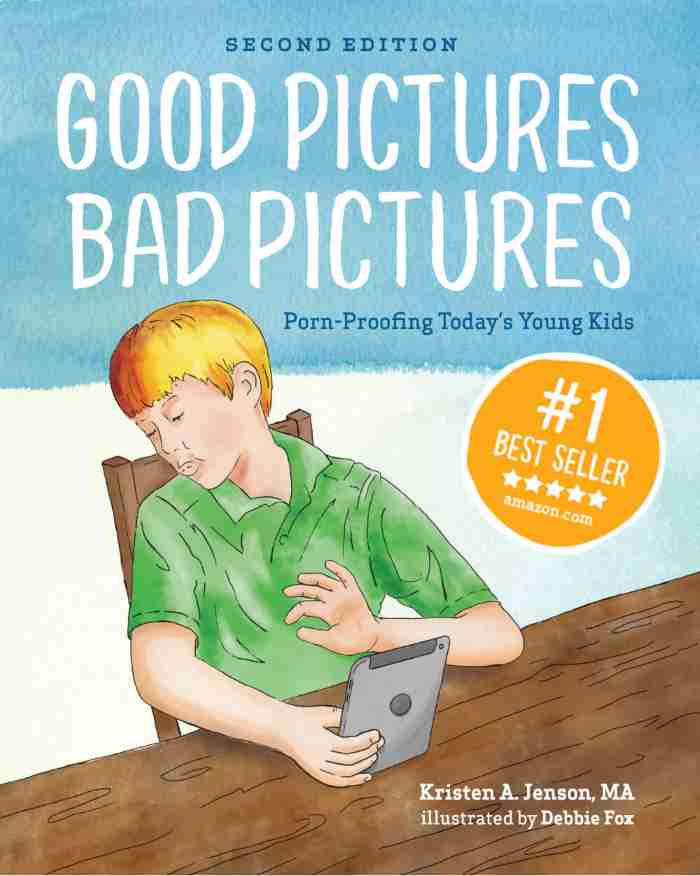.webp)
.webp)
Deep Trouble With Deepfake Porn: 9 Best Tips to Safeguard Your Kids
**Today’s post comes from our friends at Canopy. Defend Young Minds readers can take advantage of 20% off any of Canopy’s packages, monthly or annual, with code DEEPFAKE. Use this code when registering at www.canopy.us. Accessing this link via a browser (opposed to app stores) will allow you to enter the coupon code.
This is part of a Defend Young Minds series dedicated to AI and its impact on kids.**
Parenting in the digital age is tough. Challenges including pornography exposure, identity theft, excessive screen time, and unhealthy comparison can make us feel like we’re constantly battling for our kids’ safety.
%20(1).webp)
But there's a new threat on the block — deepfakes. We wish this were different. You have probably heard of them, but now we've got you covered with our best advice.
What is Deepfake Pornography?
A "deepfake" is a very realistic alteration of images, videos, or audio created using advanced artificial intelligence (AI) and machine learning. These alterations are so convincing they are hard to distinguish from actual media. Deepfakes can make it seem like real people are doing or saying things they never did.
The name "deepfake" combines "deep learning"—a type of AI that uses computer neural networks—with "fake," showing its foundation in both advanced technology and deceit.
Used maliciously, this tool can superimpose people’s faces onto explicit content, leading to a wide range of very serious effects.
When AI is used to create such content, it becomes an especially egregious violation of privacy and consent, known as deepfake pornography.
Deepfakes are easier than ever to produce
Though it’s been around for a few years, recent advances in generative AI makes it cheaper and easier than ever for a layman to produce. All it takes is a picture of the victim’s face for someone to create a short pornographic clip in only a few minutes!
Social media users are even being targeted by ads for deepfake apps. Instagram and Facebook were recently exposed for promoting a nudifying app featuring a blurred, fake nude image of 16-year old Jenna Ortega.
This has led to an explosion in the amount of deepfake pornography available online, with 98% of it targeting females, especially female celebrities like Taylor Swift and Gal Gadot. Children and teens have been victims as well, including middle-school girls
Dangers of deepfake porn to kids
How is the deepfake porn “revolution” affecting our kids? The answer is in many ways, with varying degrees of danger to their mental and social well-being. Here are a few.
Surge of porn
It’s already clear that viewing pornography is detrimental to children’s developing brains. The ease of deepfake creation is ensuring more pornography is available online than ever before.
Cyberbullying
Deepfake creation is so simple that kids have little impediments to engage in it themselves. Across the country, children are creating deepfake porn of their peers for purposes ranging from cyberbullying to revenge porn. For instance, female students in a New Jersey school were recently targeted by classmates in a deepfake scandal reported nationwide.
Sextortion
This occurs when a predator convinces a child to send inappropriate pictures or videos of themself and then exploits it for blackmail. What happens when the predator only needs a picture of your child’s face to begin attempting to blackmail them? The FBI has warned of an uptick in AI generated nude photos sextortion schemes targeting victims.
Related: Sextortion Scams and Teen Suicide: One Father's Urgent Warning
Risk of criminal charges and lawsuits
Those using nudifying technology to create deepfake pornography can be criminally prosecuted and held civilly liable. One New Jersey teen victim is suing her classmate for $150,000 for each photo he distributed.
Related:
Top 5 Ways AI Impacts Cognitive and Emotional Intelligence in Kids
Cyberbullying and Sexting–Is Your Child’s Reputation at Risk?
How can I protect my kids?
As with all online dangers, honest and open communication with your child is a key component of your online safety strategy, and is often forgotten. Before diving into digital preventive measures or addressing issues after your kid has fallen victim to deepfakes, it is critical to discuss this issue with them.
4 “deepfake discussions” to have with your child
- Deepfakes in general: Your child may not grasp the extent of this danger. Ensure they know what deepfakes are and their prevalence online. It’s increasingly difficult to identify what’s real and what’s not. Therefore, our children will always have to maintain skepticism regarding what they see, hear, and read online. “Fake news” is something that is not going away anytime soon.
- Pornography: Even if your child doesn’t seek out porn, porn will likely find him or her, regardless of safety measures you have in place. Be sure to have an early discussion of what pornography is and why it is detrimental. How early? Probably earlier than you feel comfortable with, unfortunately.
Defend Young Minds recommends beginning these talks as soon as a child has any access to the internet. The Good Pictures Bad Pictures books are comfortable read-alongs that give parents an age-appropriate script for this conversation.
- Never create, engage with, or share deepfakes! This is not a “victimless crime.” Discuss with your child the harms caused to victims. Ensure they understand it’s a crime to create deepfake pornography and can be punished both criminally and civilly.
- Where to go if they are a victim of deepfakes: If your child becomes a victim of deepfakes, swift action is crucial. Ensure your child knows they can always come to you for support. Here are some steps to take:
- Capture all evidence (as tempting as it is to delete it).
- Together, report it to local law enforcement and the hosting platform. While the legality surrounding deepfakes is evolving, some jurisdictions have enacted laws targeting their creation and distribution. If not, your child may have recourse through defamation, privacy, or harassment laws.
- Enlist the help of The National Center for Missing and Exploited Children. Their Take it Down tool offers assistance with the removal of deepfake pornography.
[[CTA]]
5 Protections to put in place today
Done talking? Great! But keep having those conversations. It’s also crucial to be proactive about monitoring online activities and setting boundaries.
Here are a five ways to put deepfake protection in place for your child, and to keep them safe online in general:
- “Follow” them: Follow your child's social media accounts. (Note: Defend Young Minds advocates waiting until at least age 16 for social media) This allows you to monitor their interactions and content they encounter, helping to spot issues early. Keep in mind - they may block you, or minimize what you can see via their privacy settings (which will tip you off less than blocking you will)! Following them won’t allow you to view or monitor their private messages, but there are parental controls tools that do and will alert you to problematic content.
- Family tech agreement: Work on your family’s “digital hygiene” by limiting when and where your kids can access their devices. This can also make it harder for them to, for instance, video chat with strangers without you knowing. Here is an example of such an agreement.
- "Sharenting”: Understand the risks of posting photos of your kids online. Many parents want to showcase their kids’ on social media for friends and family to see. It’s crucial to understand those photos can be used maliciously. This alarming video reveals how AI can manipulate innocent photos/videos posted on social media. (Viewer discretion, strong language!)
As part of your family tech plan, you could encourage or require a specific privacy policy as well - keep photos and videos within the family to the extent that you can. Find alternative ways to share photos such as via- a private group,
- email,
- or a private chat.
- Update device and app settings:
- Adjust the privacy and security settings on your child’s devices and apps, especially social media apps.
- Ensure location sharing is disabled when possible.
- Regular updates can also help protect against security vulnerabilities.
Keep in mind- Big Tech is putting more and more privacy settings into place as child safety awareness grows, so keep up-to-date on this topic.
5. Download the Canopy parental control app: Canopy utilizes advanced AI-based web filtering to block nudity (and even partial nudity, according to your settings) on your child’s phone or PC browser. It specifically targets and blocks individual images and videos within web pages, rather than blocking the entire webpage, making it a precise tool for filtering out inappropriate content while maintaining access to general information.
This approach allows you to safeguard your kids from pornography, including deepfakes, while allowing them to explore the safe and educational content the internet has to offer! Depending on your child’s device and messaging service, you can even set up sexting alerts to find out as soon as they are sent explicit content. Learn more in the Features section of our FAQs.
The worst is not behind us, but there is hope
The dangers of deepfakes will only grow as the technology behind them improves. It is already virtually impossible to discern many deepfakes - what happens when it becomes actually impossible? What will become of a generation of youth who will learn to trust nothing they see on the internet, and the generation before them who will only figure that out when it’s too late?
There is hope.
While great technical and legal minds work on a variety of partial solutions, we can do more than just cheer them on. Proactive steps you can take now include:
- Begin and continue conversations about digital dangers such as deepfake porn.
- Be careful about sharing photos of yourself or your kids on social media platforms. You might consider sharing family photos in private groups instead.
- Ensure your child knows to come to you if they become a victim of deepfake pornography. Report it to your local authorities.
Staying informed, vigilant, and having open conversations with our kids will keep our kids safer in an increasingly unsafe digital world. They’ll be happy that we did.
Start protecting your kids with the Canopy parental control app today! Start your 7-day free trial, and make sure to use the code DEEPFAKE when registering for a 20% discount.
*It's important to note that Canopy is designed to filter sites in a web browser. You can use Canopy to block apps and direct your child to the browser version of the app where Canopy can do its thing.
.webp)


Good Pictures Bad Pictures
"I really like the no-shame approach the author takes. It's so much more than just 'don't watch or look at porn.' It gave my children a real understanding about the brain and its natural response to pornography, how it can affect you if you look at it, and how to be prepared when you do come across it (since, let's face it... it's gonna happen at some point)." -Amazon Review by D.O.
.webp)
.webp)





